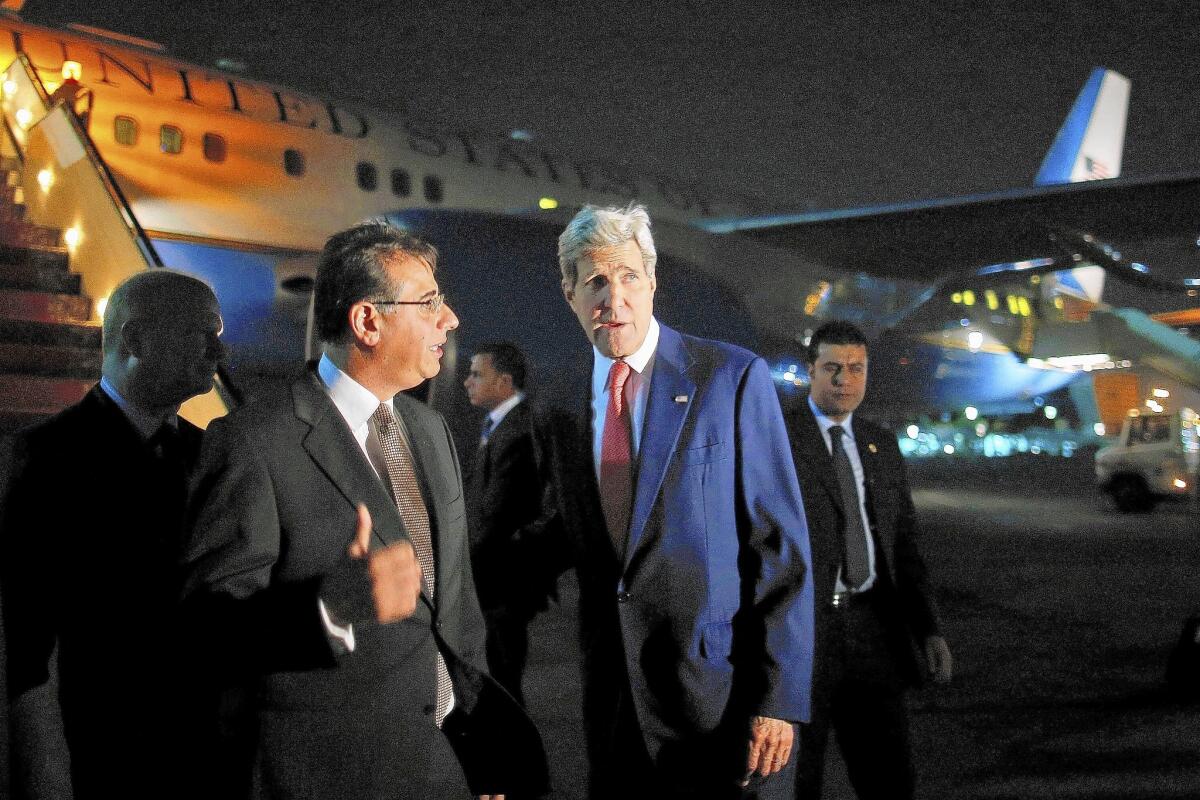As Gaza death toll rises, so do diplomatic efforts to end the crisis

- Share via
Reporting from Cairo — As Secretary of State John F. Kerry embarks on his latest Mideast mission, seeking to stem the escalating carnage in the Gaza Strip, he also wades into a complicated secondary fray: the enmity between Egypt and its regional rivals Turkey and Qatar.
The animosity between would-be peacemakers mirrors a larger split in the Middle East between authoritarian military-rooted governments and Islamist-minded regional players — a dynamic that has become increasingly important in the three years since the so-called Arab Spring uprisings. Egypt itself was a case in point, veering between a now-toppled Islamist government and the current strongman-style leadership of retired Field Marshal Abdel Fattah Sisi.
With the largely civilian death toll in Gaza soaring above 560, and at least 25 military and two civilian fatalities on the Israeli side, diplomatic efforts to resolve the crisis intensified Monday. United Nations Secretary-General Ban Ki-moon traveled to Egypt after talks in Qatar. Kerry arrived in Cairo late Monday, aiming to help revive an Egyptian cease-fire proposal.
In some quarters, optimism was growing that at least a temporary truce could be struck. Israeli television, citing Palestinian sources, reported Monday night that a limited cease-fire might be announced Tuesday in Cairo.
The Arab League, Palestinian Authority President Mahmoud Abbas and Israel last week accepted the Egyptian truce initiative, but Hamas, the militant group that controls Gaza, rebuffed it. With that, Israel’s campaign of airstrikes flared into a ground offensive. Alarmed by the mounting casualties, President Obama sent Kerry to Egypt — but the secretary appeared to be in the awkward position of trying to mediate between mediators.
Sisi, a sworn enemy of Hamas, is reluctant to cede any of the prestige of Cairo’s traditional peacemaking role between Israel and the Palestinians to anyone else in the region — especially to parties that have lent their backing to the Muslim Brotherhood, the Islamist group Sisi has sworn to eradicate. Both Turkey and Qatar fall squarely into that category.
Amid the Gaza crisis, the governments in Ankara and Doha, whose ties with Cairo have been chilly since Sisi and the army overthrew Islamist President Mohamed Morsi last summer, have touted their cordial relations with the Islamists of Hamas. Turkey and Qatar have both hosted groundwork-laying truce talks in recent days, including some that took place while Kerry was en route, and Hamas is seen as unlikely to accept any deal that does not carry their seal of approval.
Even if Egypt formally presides over the striking of an accord, the importance of a Turkish and Qatari role cannot help but rankle. Gaza-centered diplomacy yielded a particularly undiplomatic exchange last week, when Turkish Prime Minister Recep Tayyip Erdogan said acceptance of the Egypt-proposed cease-fire would lend unwarranted legitimacy to the “tyrant” Sisi. Egypt then summoned the Turkish charge d’affaires for a dressing-down.
The regional rivals differ as to the roots of the Gaza conflict. Sisi’s camp places much of the blame on Morsi, charging that during his year in office, he forged links with Hamas and allowed armed Islamist militant groups to take root in Egypt’s Sinai Peninsula, which borders Gaza.
With scant Egyptian attention paid to the Gaza frontier during Morsi’s rule, Hamas fighters were able to resupply their arsenal of sophisticated weaponry, much of it smuggled in through tunnels running under the border with Egypt.
Morsi is now jailed on an array of capital charges, among them accusations that he colluded with Hamas during his presidency.
It was the Morsi government, however, that succeeded in setting terms for halting the last major confrontation between Hamas and Israel in Gaza, in 2012. On Monday, the White House invoked that truce, Kerry would try to work out a similar agreement.
Egypt itself has sharpened Gaza’s many hardships by enforcing — along with Israel — tight restrictions on Palestinians’ movements in and out of the coastal enclave. The Gaza-Egypt border crossing at Rafah is usually closed, with Egypt citing security concerns in the northern Sinai.
But Cairo may be prepared to make concessions to preserve at least an appearance of primacy in its peacemaking role. Egypt has reportedly floated the idea of reopening Rafah, but with the crossing policed by security forces from the Palestinian Authority, Hamas’ power-sharing partner, rather than by Hamas fighters.
Such a concession would also offer a face-saving way out for Hamas. That was underscored Monday by Ismail Haniyeh, the top Hamas leader in Gaza, who stressed movement in and out of the territory as a principal demand.
“Gaza … has decided to end the blockade with its blood and resistance,” he declared in an address. “We cannot go back.”
Abbas, who has spent the duration of the fighting politically trapped between the Israelis and Hamas, radiated war-weariness in a visit to Turkey on Monday.
“What we want now is a stop to the bloodshed,” he said. “And then we can demand what we want.”
Special correspondents Maher Abukhater in Ramallah, West Bank, and Batsheva Sobelman in Jerusalem contributed to this report.
More to Read
Sign up for Essential California
The most important California stories and recommendations in your inbox every morning.
You may occasionally receive promotional content from the Los Angeles Times.










